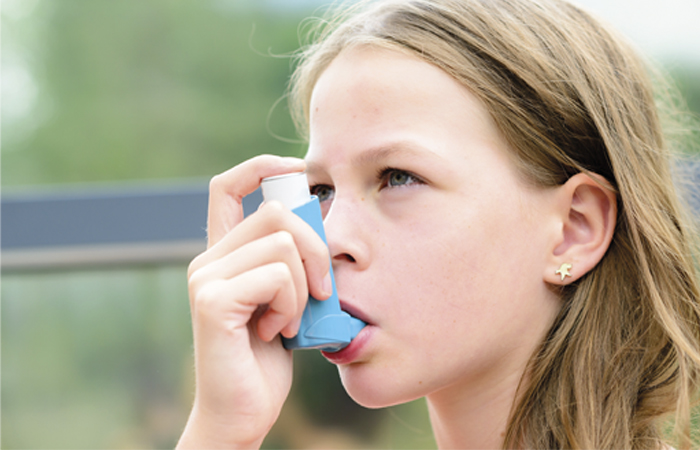Pause for breath
In In-depth
Follow this topic
Bookmark
Record learning outcomes
Air pollution has hit the headlines again, with a new report showing the scale of the problem in regional cities as well as the capital. But what does this mean and what's the impact of air pollution on public health?
Air pollution has been dubbed “the tobacco of the 21st century” and is the cause of one in 10 deaths worldwide, while in Britain it accounts for 40,000 deaths a year. “Air pollution will continue to erode our life expectancy if it is not addressed,” says Laurie Laybourn-Langton, senior research fellow at the Institute for Public Policy Research (IPPR) North and author of the new report Gearing up for the transition. “We are seeing cardiovascular and respiratory illnesses developing in younger people as a result.”

What’s more, the cost to society is comparable with that of obesity and smoking, according to the IPPR North, while the Royal College of Physicians (RCP) estimates it costs £20 billion to health services and business.
Impact on health
Air pollution comes from a range of sources including vehicles, aircraft, gas, railways, machinery and shipping. In the UK, the biggest contributor to air pollution is vehicles, especially those run on diesel..
The main pollutants emitted from these sources are carbon monoxide, nitrogen dioxide, ground level ozone, particulates, sulphur dioxide, hydrocarbons and lead. Those most prevalent in road traffic pollution are nitrogen dioxide (a gas produced through combustion) and particulates (a mix of tiny particles and liquid droplets suspended in air).
Pollutants are irritants, and when breathed in, some of the tiny particles can penetrate deep into the lungs, causing an inflammatory response that can lead to health problems.
These particles can then be absorbed into the blood circulation and carried to organs and tissues where they can cause serious damage.
“The commonest causes of air pollution-related deaths are cardiovascular diseases, pneumonia, worsening of COPD and lung cancer,” says Professor Stephen Holgate, spokesperson at the RCP and professor of immunopharmacology at Southampton General hospital. Major threats to health, if air pollution does not improve, says Professor Holgate, are respiratory disease, lung cancer, cardiovascular disease, diabetes and dementia.
Studies tend to agree with Professor Holgate. Air pollution increases a person’s risk of lung cancer and contributes in about one in 13 cases, according to National Clean Air Day statistics. It also increases the risk of death from cardiac and respiratory disease, especially among those with existing conditions, and research shows that air pollution may increase risk of type 2 diabetes. People who live near busy roads may also be at increased risk of dementia, studies have found.
Air pollution is especially dangerous to babies and children, whose organs and immune systems are still developing. Exposure to high pollution levels during pregnancy can damage a baby’s lungs, may be linked with premature birth and may affect a baby’s organ development. What's more, children who live in high pollution areas are four times more likely to have reduced lung function in adulthood, as well as a higher risk of asthma.
For older people, living near busy roads can speed up lung function decline associated with ageing and those who have existing heart or respiratory conditions are more vulnerable to the effects of pollution.
Facts & figures
- 40,000 deaths a year are attributable to air pollution in the UK
- Road transport accounts for 34 per cent of all nitrogen dioxide emissions in Britain
- Rail transport only accounts for one per cent of our total energy consumption
- By 2030 only five per cent of our cars will be electric
- Some 25 per cent of schoolchildren in London are exposed to levels of air pollution that break legal limits
- Health problems from air pollution cost the UK £20 billion a year
- Air pollution can affect the growth of unborn babies and cause premature birth
- Young children who live in polluted areas have more coughs and wheezes
- The Government has pledged to ban sales of diesel and petrol cars by 2040, and for almost every vehicle to be zero emission by 2050
- Highest pollution levels are normally during the morning rush hour
- Pollution levels are usually lower at weekends
- Air pollution is linked with lung cancer in one in 13 cases
- Air pollution may increase risk of bladder cancer.
Regional highs
Many people associate pollution with London, but IPPR’s new report Gearing up for the transition has found that regional cities are breaching the legal limits on air quality by up to 150 per cent. Congestion in the north of England is predicted to rise by three per cent annually, and the cost of congestion in Manchester and Liverpool alone is £2 billion.
“I believe if people really understood the link between pollution and road transport, they would want to do much more about it,” says report author Laurie Laybourn- Langton. “Introducing clean air zones in our cities would make a massive difference to our health. This is the most effective way of making a fast change to pollution levels. Getting rid of diesel vehicles by giving disincentives for owning these, would make an enormous improvement to our air quality. We would like to see a national scrappage scheme for diesel vehicles in the UK.”
Using cleaner transport, such as electric powered cars, would make a difference if these were widely adopted, but uptake has been slow.
“They are expensive and have a low profile. There is a lack of reliable charger infrastructure, which discourages people from buying them. If we could improve these issues, owning an electric car would be more attractive,” says Laurie.
The report says that the growth in vehicles on the UK’s roads, especially diesel, and the increase in journey times caused by more congestion, are the root cause of roadside pollution in urban areas.
This, coupled with failure to comply with legal standards on air pollution, has led to the current crisis. Since 1993, road traffic has increased by 25 per cent and is expected to increase by a further 36 per cent, to 48 per cent, by 2040 and transport is responsible for 25 per cent of the UK’s greenhouse gas emissions.
As well as changing to cleaner transport and introducing clean air zones, the report highlights the need for a shift in public attitudes towards car use. An increase in car sharing, which could be powered by car share/car pool apps, would result in fewer people owning cars. “If this happened, we would walk and cycle more, which would improve health and save us money, plus we’d need fewer roads so public money could be spent on things that enhance our wellbeing,” says Laurie.

Breathing better air
The RCP and the Royal College of Paediatricians & Child Health published the report Every breath we take: the lifelong impact of air pollution last year. It examines the effect of air pollution on our health at every age, making recommendations for change and ways to protect ourselves until this happens.
The RCP makes six recommendations to help protect people from pollution:
- Be aware of the air quality where you live
- Replace old gas appliances in your home
- Ensure you have an energy efficient home
- Alter how you travel. Take the active travel option: bus, train, walk, cycle
- Talk to your MP
- Harness technology to stay informed and monitor air pollution effectively.
People can check the air pollution levels in their area from DEFRA and there is a telephone number with a recorded forecast: 0800 556677. In London, people can subscribe to an air quality app to help minimise exposure in the capital when travelling.
“While it’s impossible to totally protect yourself from air pollution, there are steps you can take. Avoid walking next to busy roads where possible, especially in hot weather when pollution is higher and walk children to school via quieter roads where possible,” says Laurie.
For those in an at-risk group (young children, the elderly, people with lung or heart conditions), suggest they follow Government guidelines and avoid energetic outdoor activities on high pollution days and remind people with asthma that it’s essential they have medication to hand.
Something we can all do to help reduce pollution is to switch off engines when we are waiting in traffic. Studies by King’s College London found ‘no-idling days’ reduced pollution concentrations by 20-30 per cent.“By taking steps to reduce air pollution now, we will see an improvement in life expectancy, a lower incidence of respiratory and cardiovascular disease and an improvement in childhood disease, especially asthma levels,” says Laurie.
Tackling air pollution
The Government released a new plan for tackling air pollution this summer but it has been criticised by health and environmental organisations as inadequate. “The new air quality plan does not go far enough to cut pollution, not only to meet legal limits but to deliver maximum health and environmental benefits. To improve air quality in UK towns and cities, it is essential that the Government issues a clear mandate for additional cities to implement clean air zones and provide support for local action by providing the adequate tools and resources to facilitate local action,” says Professor Stephen Holgate at the Royal College of Physicians.
President of the Royal College of Paediatrics and Child Health, Professor Neena Modi agrees: “The Government’s own analysis shows that clean air zones, such as London’s low emission zone, are the most effective way to tackle the problem and yet the plan does not mandate their expansion. For the sake of children’s health, we must roll out clean air zones in the 27 parts of the country that are still breaching air quality limits.”
Laurie Laybourn-Langton, senior research fellow at the Institute for Public Policy Research (IPPR) North, says clean air zones should be a priority: “Clean air zones are what we need in our cities. They are the most effective way of making a change. Clean air zones that charge vehicles, and national coordination of the diesel phaseout are both urgently needed.”
The commonest causes of air pollution-related deaths are cardiovascular diseases, pneumonia, worsening of COPD and lung cancer
